Exclusive: 80% of covid-19 intubated died in Brazil in 2020
Lack of national protocol, with guidance on intubation, is cited by doctors as one of the reasons for the high number of deaths in Brazil
For a serious covid-19 patient with a lung who has lost the ability to oxygenate blood, intubation can relieve pain and be the only hope for survival.
But in Brazil, the high percentage of deaths among those infected who need mechanical ventilation is frightening: the average was around 80% from February to December 2020, according to data from an unprecedented survey obtained exclusively by BBC News Brasil.
In other words, 8 out of 10 patients intubated during the first year of the pandemic died. Mortality remained the same in the first and second semesters, which shows that Brazil did not know how to effectively apply the lessons learned on treating patients with covid-19.
For comparison, the world average is around 50% mortality. And, according to the researchers involved in this study, preliminary data from 2021 show that the Brazilian mortality rate is expected to worsen.
A first survey by him on mortality of covid-19 patients, published in the medical journal The Lancet Respiratory Medicine, revealed that almost 80% of patients intubated in Brazil between February 16 and August 15, 2020 died. For this survey, data from 254 thousand hospitalizations were analyzed.
Bozza finished compiling the figures for the second half of 2020 and they reveal that the mortality rate has remained close to 80%. In other words, the numbers show that after the first wave of covid-19 in Brazil, the country was not able to organize itself and adopt national treatment parameters to the point of even reducing the mortality of critically ill patients.
To reach the percentage, 163.2 thousand hospitalizations of patients with covid-19 were analyzed between August 15 and December 31 of last year. The data were obtained by the Ministry of Health's SIVEP-Gripe system, which requires all hospitals to report admissions for respiratory syndrome.
The study reveals that 78.8% of patients who needed invasive mechanical ventilation died during the second half of 2020 in Brazil.
Among the main causes are the lack of a national protocol that unifies the techniques used and the use of personnel without adequate training and experience.
"The rate remained high throughout the year. Time was wasted discussing early treatment without any scientific evidence and no investment was made in disseminating information on effective treatments for critically ill patients, such as steroid use, respiratory failure identification techniques, use of position prona and others ", evaluates Bozza.
One dies more in the North and Northeast
Unpublished data obtained by BBC News Brasil show that from February 15 to the end of December, 80% of people with covid-19 who needed invasive mechanical ventilation died.
The data obtained by BBC Brasil with the researchers show great differences in the death rate by region. In the North, the mortality of intubated patients rises to 86.7% and, in the Northeast, to 83.7%. In the Midwest, the percentage is also above the average (83.6%). In the South and Southeast, the rate is 76.8%.
According to the researcher from the Faculty of Medicine of the University of São Paulo (USP) Otavio Ranzani, who is also one of the authors of the study, the Brazilian percentage is higher than the world average, of around 50%, according to a study that analyzed data from 69 countries, published in the American Journal of Respiratory and Critical Care Medicine .
The average mortality of intubated covid patients in Asia is 47%, in Europe it is 36% and in North America it is 46%, adds Ranzani, who is also a researcher at the Institute for Global Health, in Barcelona. "The Brazilian mortality rate for the use of mechanical ventilation (invasive) is similar to that of Mexico, of 80.9%", he adds.
Now, in the worst moment of the pandemic in Brazil, ICU doctors heard by BBC News Brasil also warn of the probable increase in the mortality rate among intubated patients in all regions of the country.
This is because the overcrowding of hospitals from North to South is leading to a delay in the intubation of critically ill patients, aggravating their condition. And health professionals with no experience in mechanical ventilation are being allocated to makeshift ICUs. In addition, doctors and pharmaceutical associations warn that the stock of medicines needed for intubation is close to running out.
"The problem is that you have a very serious patient, with involvement of several organs, and that you treat him in a situation of overload, impromptu, with poorly trained teams and that contributes to even more worrying numbers," the doctor told BBC News Brasil intensivist Ederlon Rezende, who coordinates the ICU of the Hospital do Servidor Público in the State of São Paulo.
But why did the mortality of patients who needed invasive ventilation remain high throughout the first year of the pandemic?
Lack of national protocol from the Ministry of Health
Throughout 2020, much has been learned about the best techniques in the treatment of critically ill patients with covid-19, Carlos Carvalho, director of the Pulmonology Division at InCor (Heart Institute of the Hospital das Clínicas of FMUSP) told BBC News Brasil, in Sao Paulo.
But, until now, an action protocol for intubation of infected people has not been released by the Ministry of Health, while time and resources have been spent on defending drugs that are not effective in treating covid, such as chloroquine and ivermectin.
Pulmonologist Carmen Valente Barbas, who attends Hospital das Clínicas and Albert Einstein, in São Paulo, points out that following certain criteria, such as the appropriate time for intubation and the volume of air used, can define the patient's chance of survival.
Without a national orientation that brings together the best international and national experiences, each state and hospital follows a criterion. And there are discrepancies in mortality rates between hospitals in the same city and between regions of the country.
In January, when Manaus suffered a strong wave of covid-19, hospitals lacked oxygen and patients had to be transferred to other states. Intubation delay is one of the reasons for high mortality in the country
"Venting a patient with a covid is not easy, it is a weakened lung. You need to be very delicate with the machine, because it can cause barotrauma, which is a trauma associated with the pressure of the air injected into the lungs," explained Carmen Barbas to the BBC News Brasil.
"The volume of oxygen that enters the body must be 6ml per kilogram of predicted weight or less. Predicted weight is based on height. But there is a lot of place that calculates by the actual weight and this can harm the patient's lung", says the doctor , who is a professor at the University of São Paulo and an international reference in mechanical ventilation.
In São Paulo, health professionals established a set of procedures to be followed for critically ill patients, which were published on the website of the Department of Health.
"We also launched an application with guidelines on how to proceed with mechanical ventilation", says Carlos Carvalho, director of the Pulmonology Division of InCor at Hospital das Clinicas. But hospitals in the poorest areas of the country suffer from a lack of resources, information and professionals.
In the Northeast, 77% of non-elderly patients (under 60 years old) intubated died in the first half of 2020, while in the South, the rate was 55%.
"Without a doubt, if there was a more uniform protocol in the country, perhaps this would have a positive impact on the mortality rate. Develop a protocol in agreement with the specialists and customized in some way for the respective areas, in addition to investing in the training of the professionals who are going to apply this protocol, would be fundamental ", says the director of InCor.
At what time to intubate?
Another key issue for patient survival, according to experts heard by BBC News Brasil, is the time to intubate.
Carlos Carvalho recalls that, at the beginning of the pandemic, the recommendation from China was to intubate as soon as possible, when the patient began to show a sharp drop in oxygen saturation.
"The orientation in China was to intubate soon because these patients were evolving to a serious situation very quickly," he says. When the disease arrived in Europe, many hospitals did not have sufficient mechanical ventilation equipment.
Deciding when to intubate is crucial. If the use of mechanical ventilation is delayed too much, a patient can damage the lung just by the effort to breathe, say doctors heard by BBC News Brasil
While governments were organizing to buy, health professionals used masks and oxygen catheters, called non-invasive ventilation, to try to keep patients alive.
The strategy served to show that it was not necessary to intubate very early and that several patients recovered without needing invasive mechanical ventilation. But delaying intubation too much also brought problems.
"We went from one extreme to intubating everyone to one extreme to postpone intubation as much as possible. Then there started another problem. When you postpone too much, the patient, for breathing hard, for pushing too hard, he hurts his own lung ", explains the director of Pulmonology at Hospital das Clínicas.
"So, when some patients were intubated, they already had a very inflamed lung, very hurt by their own effort to breathe."
According to the former president of the Brazilian Association of Intensive Care Medicine Ederlon Rezende, currently, the best practice provides for non-invasive ventilation for those who have mild respiratory syndrome and intubation for the severe one. It is in patients with moderate severity that the difficulty of decision is greatest.
"In moderation, you have to find the middle ground. It is worth starting with the non-invasive and carefully observing the patient to check for signs that he is not tolerating well. If he does not respond well, you must quickly indicate invasive ventilation, because it is very harmful for the patient to postpone intubation ".
Prolonged intubation poses risk of infection
Once the patient is intubated, the intensive care professional needs to be qualified and trained to know the most appropriate time to remove mechanical ventilation. Again, the decision can be a factor in life and death.
"There are parameters for recovery of the lung injury that must be observed for the removal of the device", says Rezende. Disintubating before the body has created antibodies to fight the virus and regained lung capacity can be risky. On the other hand, the longer the patient remains intubated, the greater the risk of catching bacterial infections.
"When you put a prosthesis in the airway, for ventilation, you are creating a situation that makes it easier for the bacteria that are in our intestines and that normally stay there, to reach the airway, and this increases the risk of infections", says the former president of the Brazilian Association of Intensive Care Medicine.
"Studies show that the chance of a patient with covid developing pneumonia associated with mechanical ventilation is twice as high as in patients without covid. And, when patients who have covid develop this condition, the risk of unfavorable evolution is much greater."
And to apply all the best practices in the intubation of patients with covid it is, of course, necessary to have trained professionals.
"People think that it is enough to put it on the ventilator and that it will do everything. Not at all. Handling the equipment requires training, experience, sensitivity to understand the patient's response", highlights Ederlon Rezende.
That is where another factor comes in that, according to doctors, has led to the high number of deaths of intubated patients in Brazil: shortage of doctors and nurses specialized in the ICU.
Lack of training and specialized professionals
The ICU supervisor at Hospital Emílio Ribas, Jaques Sztajnbok, points out the flawed qualification and insufficient training of doctors in Brazil as one of the main factors for the high mortality rate of patients who need intubation.
"There is an aspect that is the quality of professional training of colleagues who are on the front line. The covid patient is almost a compendium of intensive medicine, because it is a very serious disease, with multisystemic involvement, causing thrombosis, renal failure, pulmonary inflammation, respiratory failure, cardiac risks ... ", he quotes.
Professional training and resource management can help explain why referral hospitals, such as Emílio Ribas, Albert Einstein and Hospital das Clínicas manage to maintain a mortality rate that varies from 30% to 45% - well below the Brazilian average.
"Our lethality, in my ICU, with public doctors, in a training center, was around 34% in patients with mechanical ventilation. And we are a public service. Covid is a disease for which it is necessary to have well-trained professionals" , completes the ICU supervisor at Hospital Emílio Ribas.
Carlos Carvalho, from InCor at Hospital das Clinicas, argues that the federal government and states should invest in training frontline teams to fight covid-19.
ICU directors advocate federal and state investment in training doctors and nurses on how to care for severely ill patients with covid. They say that qualifying teams has a direct impact on reducing the death rate
He has promoted virtual classes for professionals in São Paulo and suggests that university hospitals - federal and state - form a consortium for training across the country.
"The training and education of health professionals is flawed in the sense of applying a national and international knowledge protocol. Today, after a year, we already have more information on how to treat a patient with covid, but there is a lack of qualifications", he says.
"You can duplicate a bed, a fan, but you don't have nurses and doctors trained to manage all this equipment or extract the best information from them."
Without confinement, uncontrolled infection led to improvisation
Another aspect that contributed to increasing deaths in Brazil, according to doctors, was the need for improvisation in visits, due to uncontrolled infections in Brazil. With hospitals collapsing, at different times of the pandemic, it was necessary to allocate professionals from other areas of health to ICUs.
Without adequate training or experience in intensive care, these people had to deal with complex machinery and decisions that define whether a patient will live or die.
The numbers in the research by Ranzani and Bozza show that a patient intubated in an ICU is much more likely to survive than those treated with mechanical ventilation in the infirmary or in the corridors.
In the Northeast, where the mortality rate of intubates was higher than the national average, 16% of patients seen in the first half of 2020 received mechanical ventilation outside the ICUs - in corridors or wards, for example. In the South, the region with the lowest mortality, only 8% of patients were intubated outside an ICU.
"The more specialized the service, the lower the mortality," says Albert Einstein's pulmonologist Carmen Valente Barbas, professor at USP's School of Medicine.
"What has been done in some hospitals in the country is an attempt at urgent training for doctors, nurses and physiotherapists who ended up having to work in the intensive area, due to the emergency situation. But it is not the same thing as having training and experience in the field. "
The doctors heard by BBC News Brasil say that the scenario of improvisation and chaos, which directly impacts the number of deaths, could have been minimized, if measures of social distance and isolation had been adopted, in conjunction with a national message of defense of the use mask and constant hand washing.
"There is a major communication problem in the country, because it does not have a single orientation in saying that it needs to wear a mask and keep distance", criticizes USP professor Carlos Carvalho, director of the Pulmonology Division at Hospital das Clínicas
"Any slip, if you have the misfortune to be close to someone with a covid and not take care, you get it quickly. It can happen when you lower your mask to eat a sandwich", highlights Carmen Valente Barbas, who was intubated seven days after getting covid -19 last year.
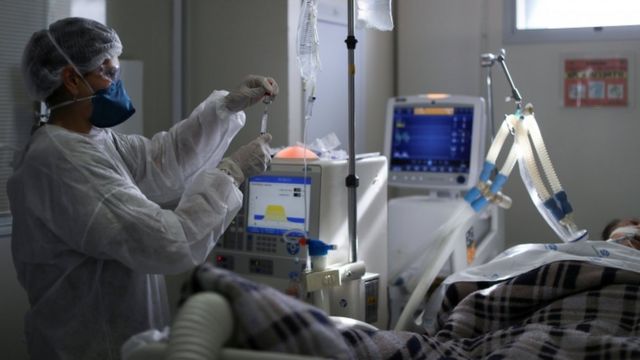
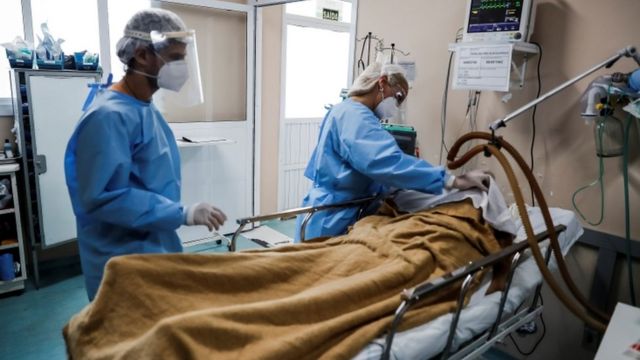
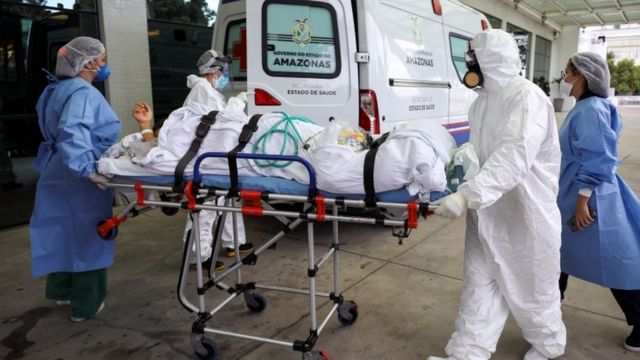
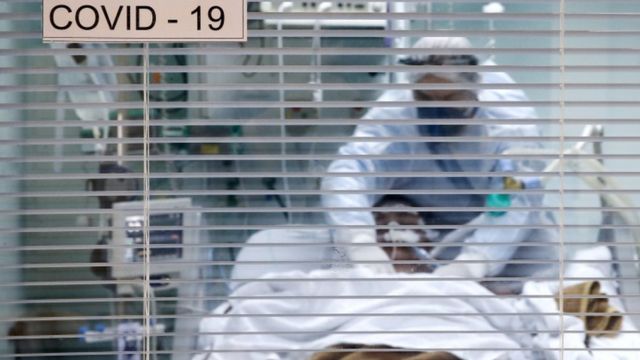
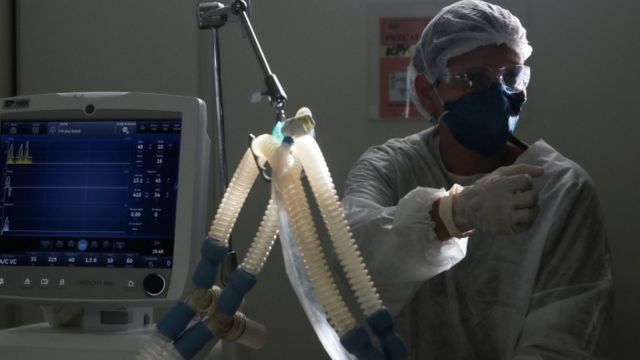

No comments:
Post a Comment